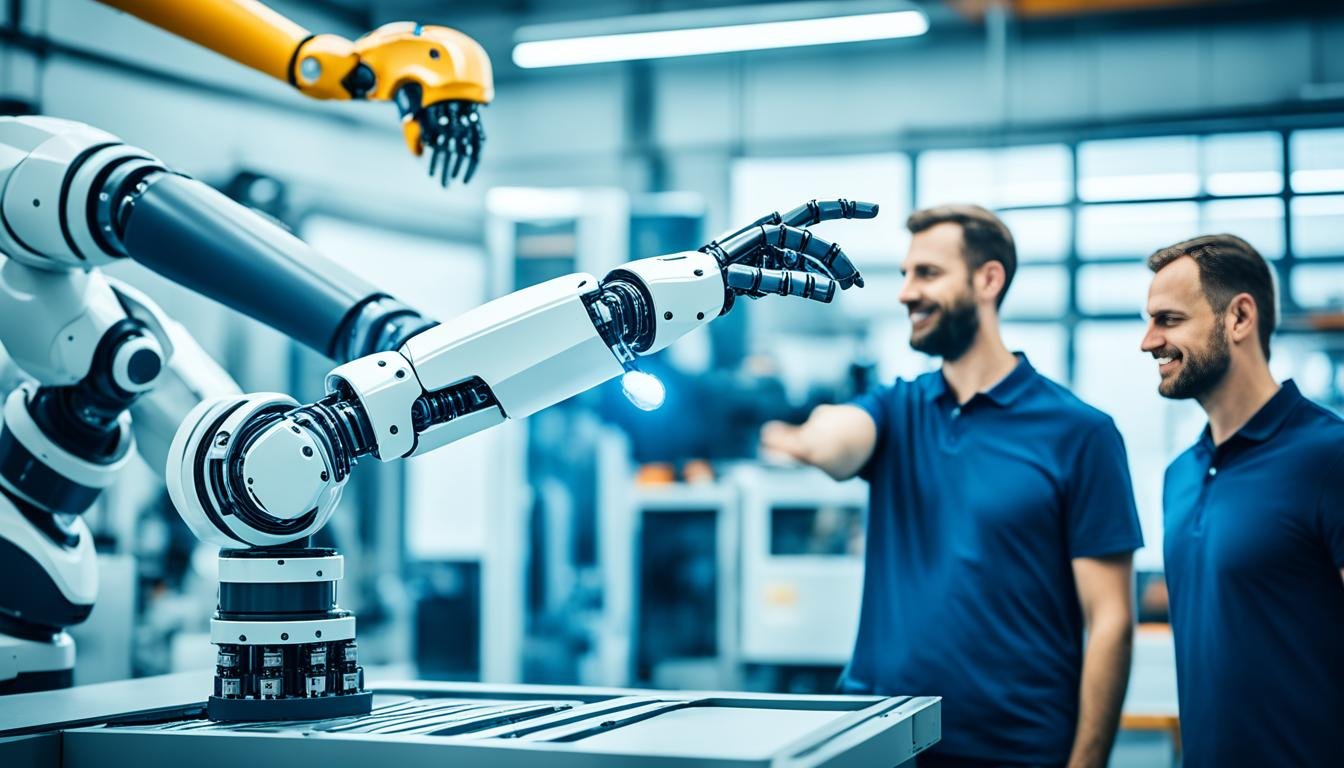OpenAI CEO Sam Altman says, “Many people think AI will only help, not replace jobs.” But he believes, “jobs will indeed disappear, period.” This year, two big labor strikes by the Writers Guild of America and the actors union (SAG-AFTRA) have made people realize AI’s threat to high-paying jobs. Artificial Intelligence is set to change work worldwide soon. It’s unclear if this will make things more or less unequal.
AI is still new, but we can learn from past big changes like the power loom and digital computers. These innovations show us what AI might do next.
Key Takeaways
- AI is projected to affect 40% of jobs globally, with higher exposure in advanced economies.
- Automation and AI are expected to displace between 400-800 million jobs by 2030, requiring millions to switch job categories.
- Middle-skilled jobs are at the highest risk of automation, while low- and high-skilled jobs are less vulnerable.
- Emerging job opportunities in AI, data analytics, and technology-related fields are expected to grow rapidly.
- Reskilling and lifelong learning are crucial for workers to adapt to the changing job market driven by AI and automation.
Introduction to AI and Its Impact on Jobs
Artificial Intelligence (AI) is changing the job world a lot in the next few decades. It’s already making a big impact in many industries. It’s changing how work gets done and what skills are needed for the future.
What is AI and How is it Transforming Industries?
AI means making computers do tasks that usually need human smarts, like learning and solving problems. It’s being used in many areas, from healthcare to finance. This tech makes things run smoother, increases productivity, and cuts costs. This is changing the job market.
AI’s Potential to Create and Displace Jobs
AI could bring new jobs, but it also threatens some current ones. Goldman Sachs says AI might replace a quarter of jobs in the US and Europe. A study by the MIT-IBM Watson Lab found that two-thirds of US and European jobs could be affected by AI.
The effect of AI on the economy will be big. McKinsey Global Institute predicts AI could add about $13 trillion to the global economy by 2030. But, moving to an AI-driven job market will be tough. Workers will need to learn new skills and find new jobs.
“AI has the potential to be one of the most disruptive technologies across global economies, according to Forbes.”
As AI gets better and more common, we all need to understand how it will change jobs. It’s important for people, companies, and leaders to keep up with these changes. Being ready and adaptable will help us deal with the future of work.
Jobs Most Likely to Be Automated by AI
Artificial intelligence (AI) is changing the job market fast. It’s taking over many tasks and could replace many jobs. Jobs that involve simple data work, summarizing data, and writing are most at risk.
Routine and Repetitive Tasks at High Risk
AI is great at doing tasks that are predictable and follow set rules. Jobs like checking rules, clerical work, and helping customers are likely to be taken over by AI. A Goldman Sachs study says AI could replace 300 million full-time jobs worldwide.
Examples of Jobs Vulnerable to Automation
- Customer service representatives
- Receptionists
- Accountants and bookkeepers
- Salespeople
- Research analysts
- Warehouse workers
A study by McKinsey Global Institute says by 2030, up to 14% of workers might need new careers because of AI and automation. As AI gets better, workers will need to keep learning to stay ahead in the AI-driven job market.
| Occupation | Projected Growth by 2032 |
|---|---|
| Nurse Practitioners | 45.7% |
| Choreographers | 29.7% |
| Physician Assistants | 27.6% |
| Mental Health Counselors | 22.1% |
| Nursing Instructors and Teachers, Post-Secondary | 21.5% |
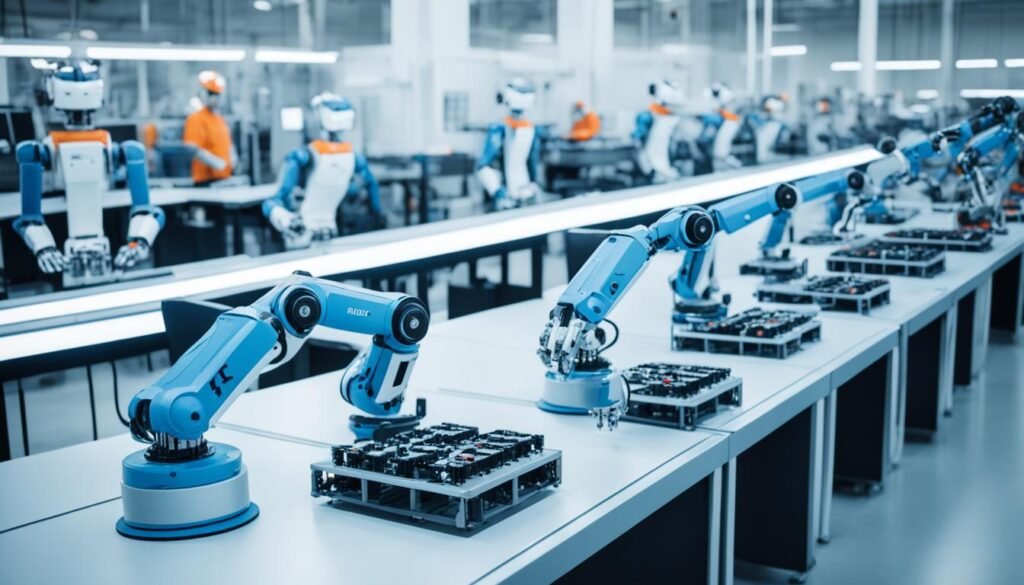
“Automation could potentially automate between almost zero and 30 percent of global work hours by 2030.”
how ai will affect jobs
The rise of artificial intelligence (AI) has sparked both excitement and worry about its job market impact. AI threatens some jobs but also opens new doors and improves others. Knowing how AI will change work helps you get ready for the future.
AI’s Role in Job Creation and Enhancing Existing Roles
AI could add about $13 trillion to the global economy by 2030, says the McKinsey Global Institute. This will come from automation and new innovations in products and services. By 2030, 70% of companies will have adopted AI technology.
AI can automate routine tasks, letting workers focus on strategy and creativity. This could improve current jobs and create new ones, like AI trainers and data analysts.
Emerging Job Opportunities in AI and Data Analytics
- AI Trainers and Teachers: Responsible for developing and training AI systems to perform specific tasks.
- Data Analysts and Scientists: Analyze data to uncover insights and inform decision-making processes.
- Human-Machine Teaming Managers: Coordinate the collaboration between human workers and AI systems.
- AI Ethics and Policy Specialists: Ensure the ethical and responsible development and deployment of AI technologies.
The shift to an AI-driven job market will take decades. But, the demand for skilled professionals in these areas will keep growing. By embracing lifelong learning and being adaptable, you can excel in the changing job world.
“The transition to AI is expected to take half a century or more according to Pew Research.”
Impact of AI on the Workforce and Employment
AI is changing how we work and the jobs we have. Automation and AI are making some jobs obsolete and creating new ones. This change affects many industries.
Changes in Skill Requirements and Job Displacement
Automation is taking over simple tasks, making things more efficient. This means some jobs are disappearing, while new ones appear. For instance, manufacturing workers now need skills for machines and robots.
AI is also creating new jobs like data analysts and machine learning experts. These jobs need both technical skills and knowledge of business.
Studies show that jobs in AI, big data, and manufacturing are growing fast in China. But, the World Economic Forum warns that 85 million jobs could be lost in 15 industries over the next five years due to automation.
AI’s effect on jobs varies by industry and occupation. Jobs in sectors like agriculture and manufacturing might see more automation. Older workers and those with less education are at higher risk of losing their jobs.
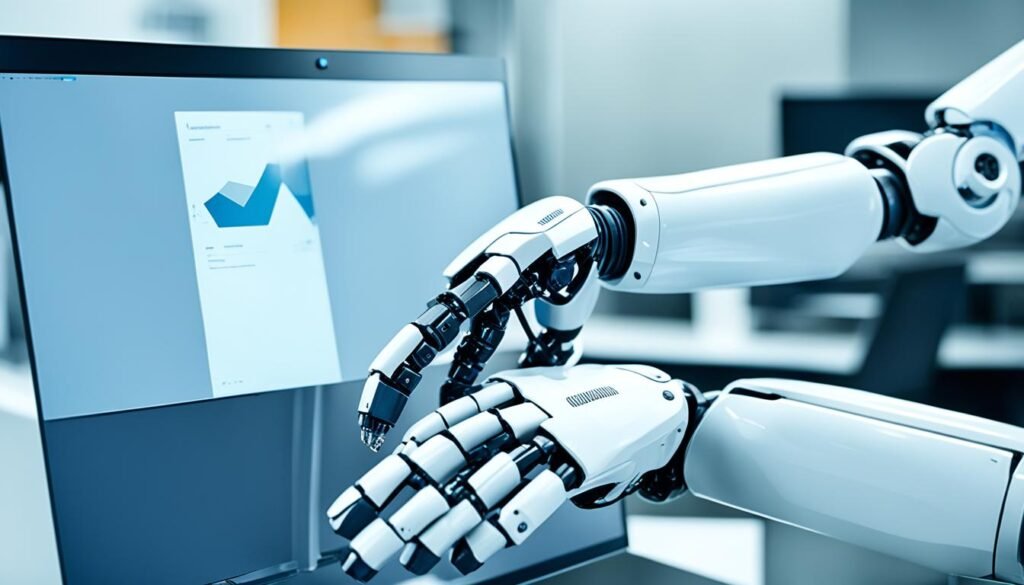
However, some jobs like data entry are seeing fewer openings because of automation. AI is expected to greatly affect jobs in China, especially in manufacturing, where many workers are at risk.
As AI changes the job market, it’s crucial for workers and companies to adapt quickly. Staying ahead of these changes is key to success.
Preparing for the AI-Driven Job Market
The job market is changing fast because of AI and new technology. People need to keep up to stay ahead in their careers. This means taking courses, going to workshops, or getting certifications in areas like data analytics, machine learning, and programming. It’s also key to use AI to make work easier and more efficient.
Reskilling and Upskilling for AI-Related Roles
Workers need skills like data analysis, programming, and machine learning to do well in an AI-driven job market. A World Economic Forum report says AI will create 97 million new jobs but also displace 85 million, adding 12 million jobs overall. Jobs that are very repetitive or predictable are most at risk of being automated, according to McKinsey. To keep up, people should learn new skills for AI jobs.
Embracing Lifelong Learning and Adaptability
Learning new skills is important, but so is lifelong learning and being adaptable. The World Economic Forum 2020 Future of Jobs Report suggests building skills like analytical thinking, creative problem-solving, leadership, and technology use. As AI changes industries, workers need to keep up with new trends and be ready to adapt to job changes.
| Skill | Importance in the AI-Driven Job Market |
|---|---|
| Data Analysis | Crucial for understanding and leveraging the vast amount of data generated by AI systems |
| Programming | Essential for developing and maintaining AI-powered applications and systems |
| Machine Learning | Fundamental for designing, training, and deploying AI models to solve complex problems |
| Analytical Thinking | Valuable for identifying patterns, making informed decisions, and problem-solving in an AI-driven environment |
| Creativity and Innovation | Crucial for developing novel solutions and ideas that complement AI capabilities |
By embracing lifelong learning and adaptability, people can confidently move through the AI-driven job market. They’ll be ready as the job landscape keeps changing.
“The future of work is not about human vs. machine, but about human and machine.” – Satya Nadella, CEO of Microsoft
Potential Benefits and Drawbacks of AI in the Workforce
Artificial intelligence (AI) is changing the workforce in many ways. It can automate simple tasks, letting workers focus on harder, more creative tasks. This makes businesses more efficient and workers happier.
AI is also creating new jobs in fields like data analytics and AI development. It’s growing fast, with an expected 54% annual growth rate. About 80% of employers are using AI in some way. The World Economic Forum predicts 97 million new jobs by 2025, thanks to AI.
But, AI’s growth also means some jobs might change or disappear. It could lead to a 14% job loss globally by 2030. By 2025, AI might take 16% of jobs in the U.S.
Using AI in the workforce also brings up privacy and data security concerns. Companies must balance AI’s benefits with protecting privacy and data. This builds trust with users and stakeholders.
To tackle these issues, companies should invest in training programs for employees. They should also follow strict data privacy rules and handle data responsibly. This way, they can enjoy AI’s benefits while reducing risks.
| Benefits of AI in the Workforce | Drawbacks of AI in the Workforce |
|---|---|
|
|
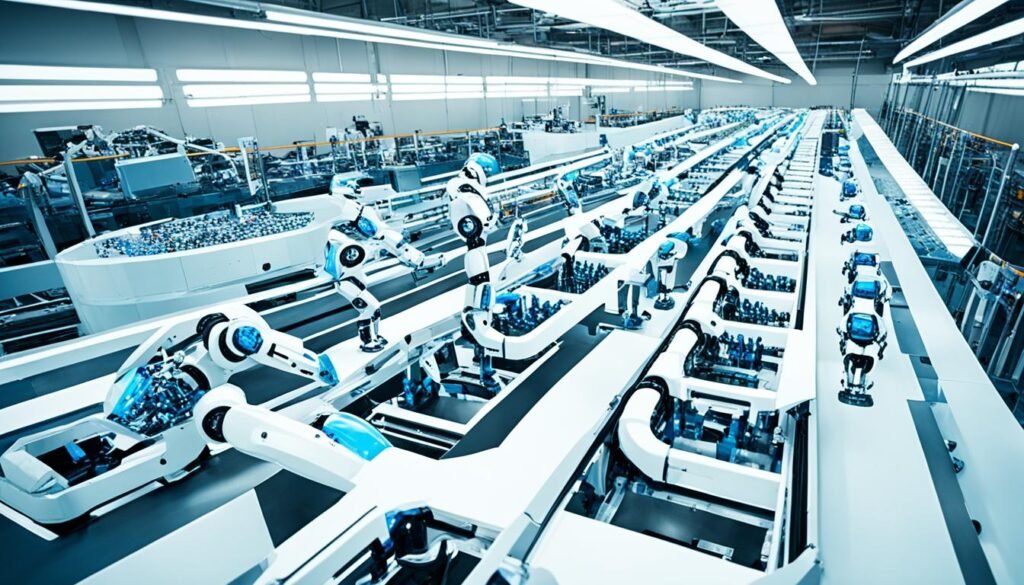
“AI is projected to generate more jobs than it will take away, but businesses need to develop a comprehensive strategy to balance the benefits and address the potential risks.”
The Role of Policymakers and Businesses
Artificial intelligence (AI) is changing jobs and the job market. Policymakers and businesses must step up. AI creates new jobs but also replaces old ones, especially in tasks that are routine. The World Economic Forum says by 2025, AI will take away 75 million jobs but add 133 million new ones. This means 58 million new jobs overall, but some jobs will be lost.
Addressing Job Displacement and Workforce Transition
To help workers who might lose their jobs, policymakers and businesses need to work together. They should offer training and education to help workers get new skills. It’s important for businesses and policymakers to make sure workers can move into new roles smoothly.
Promoting Ethical and Responsible AI Development
Policymakers and businesses must also focus on making AI ethical and responsible. They need to make sure AI helps workers and society as a whole. This means having rules to protect workers, stop bias, and make AI clear and answerable.
By working together, we can lessen the bad effects of AI on jobs. This way, everyone can benefit from this new technology.
| Scenario | Job Elimination | Job Creation Ratio | Impact on Employment |
|---|---|---|---|
| Best-case | 0% of current jobs | 5:1 | Minimal job displacement, robust economy |
| Worst-case | 50% of current jobs | 1:2 | High job displacement, weak economy |
“The speed of job elimination by AI is highlighted as a critical driver of impact on employment.”
Case Studies and Real-World Examples
AI is changing how we work in many industries. It’s making things more efficient and changing jobs. Let’s look at how AI is affecting jobs in different sectors.
AI’s Impact on the Finance and Banking Sector
In finance and banking, AI is a big deal. A report found 56% of banks use AI for management and 52% for making money. But, it also warns that 23% of jobs in China’s finance could be lost to AI by 2027.
AI’s Role in Media and Marketing
Media and marketing are using AI too. In 2020, 84% of marketers used AI, up from 29% the year before. AI is changing how they make content, advertise, and talk to customers.
AI’s Effect on the Manufacturing Sector
Manufacturing is changing fast with automation and AI. A factory in Dongguan City used machines to replace most workers. This led to a 250% increase in productivity and an 80% drop in mistakes. But, workers now need new skills to keep up with these machines and AI.
AI’s Impact on the Healthcare Industry
In healthcare, AI helps doctors and nurses with things like making diagnoses and treatment plans. This has made patient care better and eased the workload of healthcare workers. But, jobs like medical transcriptionists and health information technicians might be taken over by AI.
These examples show how AI is changing the job market. It can make things more efficient but also worries about losing jobs. We need to work together to make sure workers can adapt to the AI-driven future of employment.
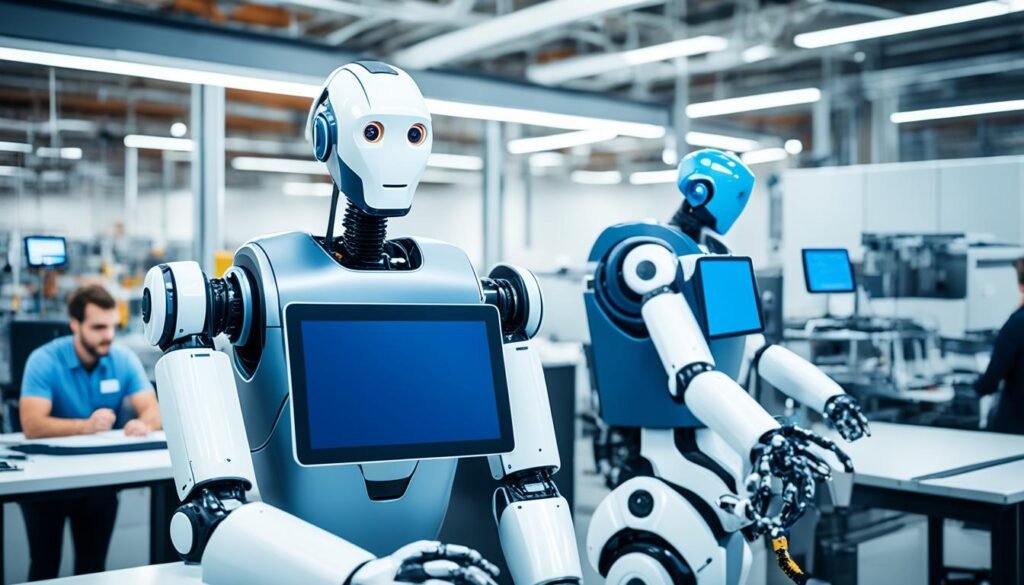
Future Outlook and Trends
By 2030, artificial intelligence (AI) will change the job market a lot. Experts say AI will create 20-50 million new jobs worldwide. This will change industries and what skills are needed.
Emerging AI-Driven Roles and Skills
AI is creating new jobs. These include AI trainers, data analysts, human-machine teaming managers, and AI ethics specialists. These jobs need technical skills, analytical thinking, and knowledge of AI ethics.
There will also be more demand for people who can use AI insights to make business decisions. The combination of AI and Robotic Process Automation (RPA) will be key. RPA automates routine tasks, which AI can analyze better.
Challenges and Considerations
- AI is making new jobs but also replacing some, especially in tasks that are routine. The World Economic Forum says AI will displace 75 million jobs by 2025 globally.
- As AI grows in businesses and society, ethical AI development and governance are becoming more important. Making sure AI is used responsibly and transparently is crucial.
- Workers will need to keep learning new skills to adapt to the AI-driven job market. Reskilling and upskilling will be key to keeping up with job changes.
The future of work will be shaped by AI’s transformative power. It will bring both challenges and opportunities for workers worldwide. Being proactive and adaptable will be important for success in the AI-driven job market.
| Statistic | Significance |
|---|---|
| Use of AI in many sectors of business has grown by 270% over the last four years. | This shows how fast AI is being adopted and integrated into industries, showing its growing role in the job market. |
| 90% of leading businesses have ongoing investment in AI technologies. | This shows a wide commitment to AI and its ongoing impact on jobs and the workforce. |
| More than half of businesses that have implemented some manner of AI-driven technology report experiencing greater productivity. | This suggests AI can make businesses more productive, leading to new jobs and some jobs being automated. |
| Attacks in cybersecurity rose 600% during the pandemic. | This highlights the growing need for cybersecurity and the potential for AI solutions to address threats, creating new job opportunities. |
Conclusion
The impact of AI on job roles is big and wide. Some jobs might lose out to automation, but others are changing to use AI. We need to make sure AI’s benefits help workers and society too.
We should create plans to help workers at risk from AI. They should get training and education for new jobs. This way, AI and human workers can work well together, reaching common goals and making progress.
AI’s effect on jobs is complex, with both good and bad sides. As things change, staying flexible, always learning, and working with AI is key. This approach will help workers and industries adjust to AI’s changes. It will lead to a future where AI and human skills work together, making work better for everyone.
FAQ
What is the impact of AI on jobs?
OpenAI CEO Sam Altman says AI will change work a lot. He believes many jobs will be lost. AI will take over tasks that are routine or repetitive.
Which jobs are most likely to be automated by AI?
Jobs like those in regulatory compliance or clerical work are at risk. Also, jobs that involve simple data tasks or writing are likely to be automated. Customer service reps, accountants, and salespeople could also see changes.
Is AI only creating job displacement, or is it also creating new job opportunities?
AI is not just taking jobs away; it’s also creating new ones. It could add around trillion to the global economy by 2030. New jobs will include AI trainers and data analysts.
How can individuals adapt to the changing job market due to AI?
To keep up, people should learn new skills. Courses in data analytics or programming can help. Using AI to improve work efficiency is also a good strategy.
What are the potential benefits and drawbacks of AI in the workforce?
AI can lead to more innovation and efficiency. But, it also raises concerns about job loss and bias in algorithms. It’s important for everyone to work together to make sure AI benefits society.
